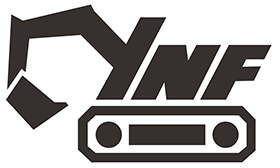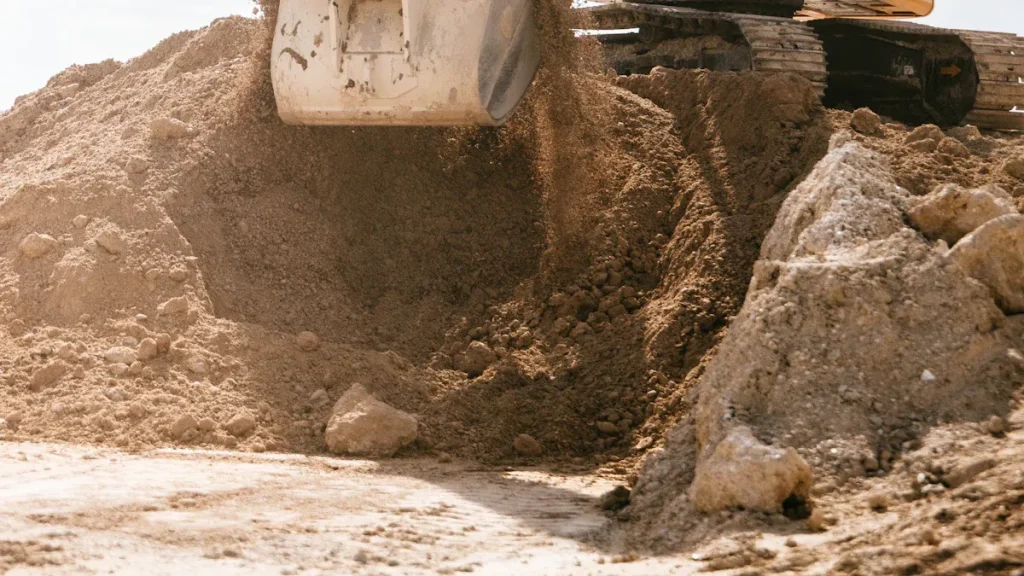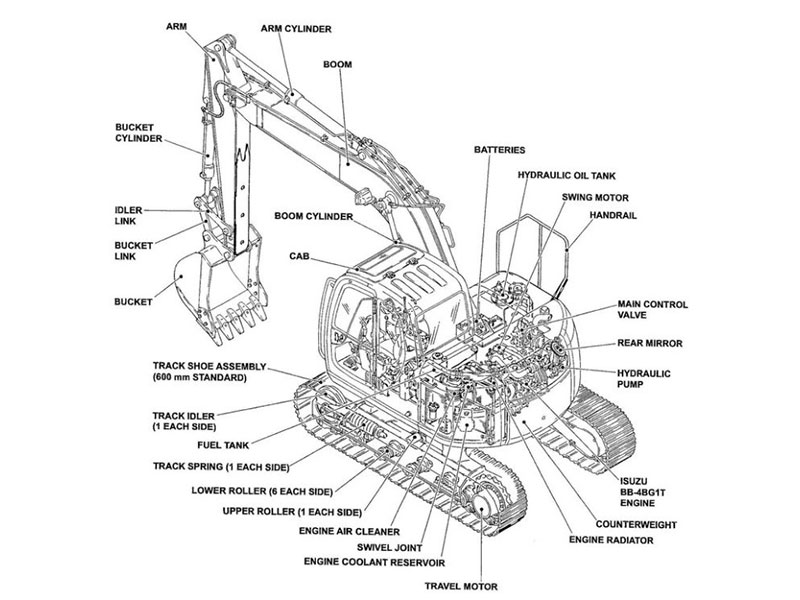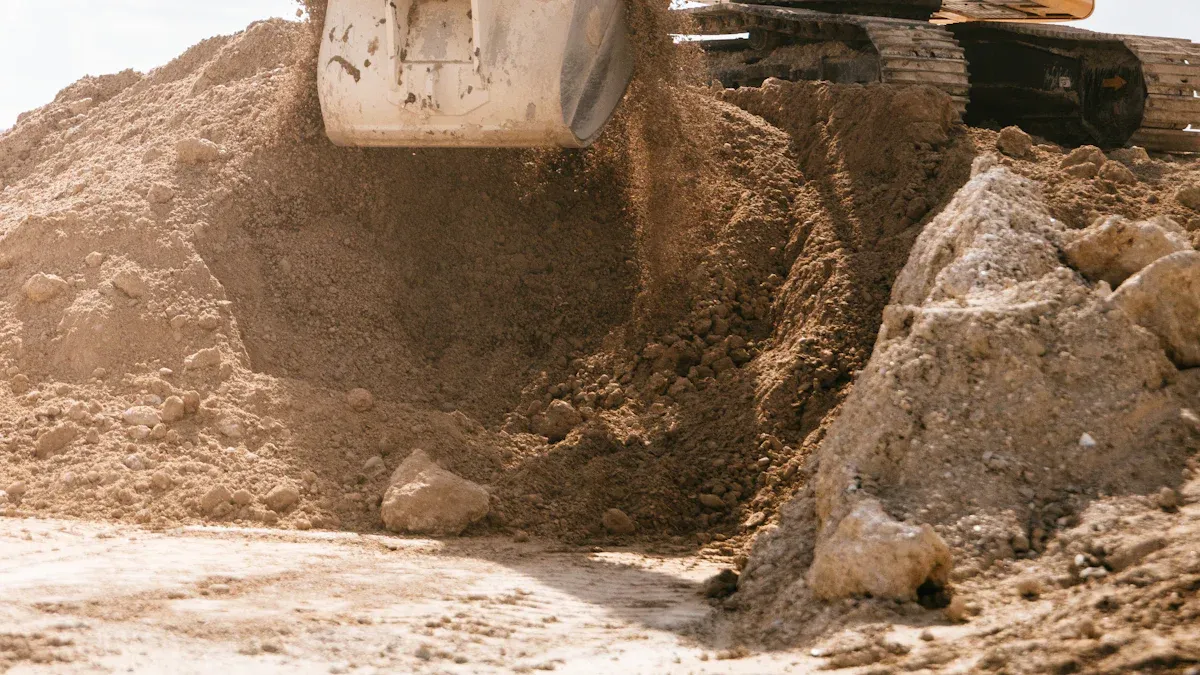
No one likes losing time and money. If your excavator is not working, your project can slow down. Choosing the best excavator spare parts keeps your machine working well. This helps you stop sudden problems. Low-quality or fake excavator spare parts are risky. They can cause more repairs and make your machine work worse. This can make downtime last longer.
Many companies now pick high-quality parts. This helps them work better and have less downtime.
If you do preventive maintenance, your excavator will keep working hard. This helps you avoid annoying breakdowns.
Key Takeaways
Learn your excavator’s model and details. This helps you get the right spare parts. It also stops expensive mistakes from happening.
Always make sure the part fits before you buy it. This keeps your excavator safe from harm. It also lowers the chance of it breaking down.
Set up a regular plan for checking your machine. Looking at your excavator often finds small problems early. This stops them from turning into big repairs.
Pick high-quality OEM parts instead of cheap ones. Good parts work better and break less often.
Keep your spare parts neat and easy to find. This helps you fix things fast and keeps your work going.
Know Your Excavator
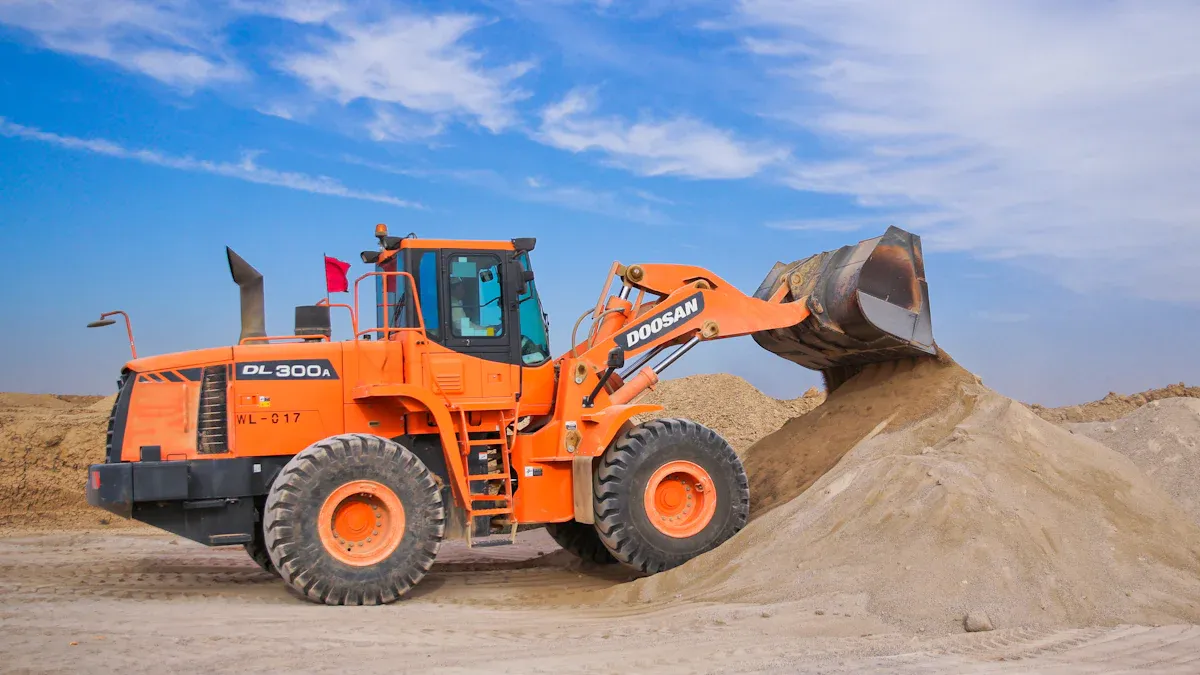
Identify Model and Specs
Before you buy any spare parts, you need to know your machine inside and out. Every excavator has its own model and specs. If you mix these up, you could face big problems. For example, if you use the wrong specs, your final drive might fail. That means your excavator stops moving, and your project stops too. You want to avoid that at all costs.
Here’s a quick look at some of the most common excavator models you might see on job sites:
Brand | Model Type | Size/Weight Range |
|---|---|---|
Caterpillar | Various models | Long-reach, wheel, demolition, etc. |
Komatsu | Small, Mid-size, Large, Mining | 24.4 hp to 1,046 hp, 6,500 lbs to 450,000 lbs |
John Deere | Compact, Mid-size, Large | 14.5 hp to 512 hp, 3,790 lbs to 189,000 lbs |
Bobcat | Compact, Large | 10.2 hp to 24.8 hp, 2,600 lbs to 38,000 lbs |
JCB | Compact, Large | 4,211 lbs to 60,184 lbs, various hp |
You can usually find your model and specs on a plate near the cab or in your owner’s manual. Write these down and keep them handy. If you ever need to order parts, you’ll have the right info ready.
Tip: Double-check your model and specs before you order anything. Even a small mistake can lead to downtime and extra costs.
Check Part Compatibility
Now that you know your model, you need to focus on compatibility. This is the most important step when choosing spare parts. If you get the compatibility wrong, you risk more than just a wasted purchase. You could damage your excavator or cause a breakdown.
Here’s how you can make sure you get the right compatibility every time:
Match the part number from your manual with the part you want to buy.
Ask your mechanic or operator to confirm the compatibility.
Look for signs of counterfeit parts. These often have poor compatibility and can cause failures.
Pay attention to details like track tension. If you use a part with the wrong compatibility, you might see increased wear or even total failure.
You should always check compatibility before you install any part. Compatibility affects everything from safety to how long your excavator lasts. If you ignore compatibility, you might end up with more downtime and higher repair bills. Make compatibility your top priority every time you shop for parts.
Note: Compatibility is not just about size. It includes fit, function, and even the way the part works with your machine’s systems. Never guess—always check compatibility!
Preventive Maintenance Essentials
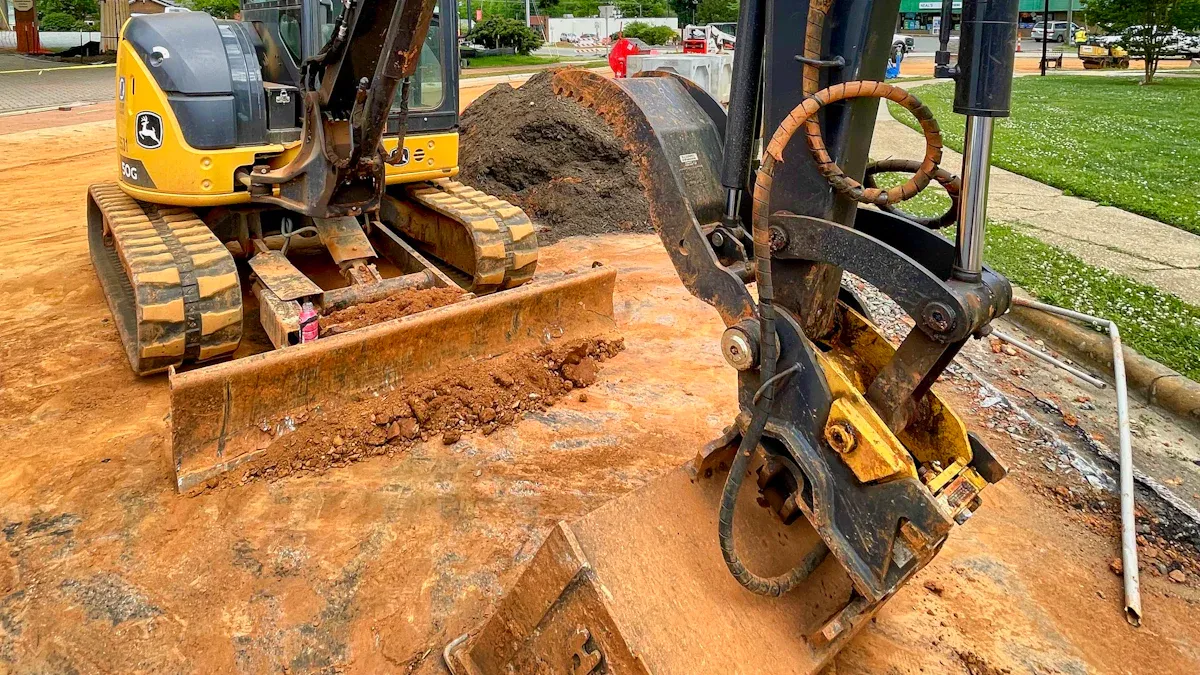
Preventive maintenance helps your excavator keep working. It stops costly downtime. If you follow a good routine, you find small problems early. This saves money and keeps your project moving. Let’s see how you can make a plan that works for you.
Schedule Regular Inspections
Inspections are very important for your excavator. Regular checks help your machine last longer. When you look at your machine often, you find issues early. This stops sudden breakdowns. Your equipment stays safe. Your team keeps working.
Most makers say to check your machine every day. Do this before work starts and after your shift ends. These quick checks help you find leaks or loose bolts. You also spot worn-out parts. Plan for bigger checks every month, quarter, and year. If your excavator works in tough places, check it more often.
Here is a simple list to help you remember:
Daily: Walk around before and after each shift.
At key times: Full checks at 250, 500, and 1,000 hours.
Monthly, quarterly, yearly: Deep checks and service.
Routine jobs like adding oil, changing filters, and checking fluids are important. These steps help stop breakdowns. They keep your excavator working well.
Tip: Don’t wait for something to break. Make inspections a habit. This small step saves you from big repairs and lost time.
Use a Machine Log
A machine log helps you do smart preventive maintenance. Write down every inspection, repair, and part change. This makes a clear history for your excavator. It helps you plan and avoid surprises.
Let’s see what a good machine log can do:
Benefit | Description |
|---|---|
Early Detection of Potential Issues | Regular checks find small problems before they get worse. |
Compliance with OSHA | Helps you follow safety rules and avoid fines. |
Risk Management | Lets you plan for problems and needed part changes. |
Employee Safety | Stops accidents by finding and fixing safety problems. |
Prevent Breakdowns and Downtime | Regular care lowers the chance of sudden breakdowns. |
Increase Lifespan of Equipment | Routine service and new parts help your machine last longer. |
A detailed log helps you track every part’s condition. You know when you last changed a filter or checked the hydraulic system. This makes planning easier. You don’t miss important steps. You are ready for safety checks.
Keeping a machine log is not just paperwork. It helps you build a plan to stop breakdowns, protect your team, and get the most from your excavator.
If you want to stop breakdowns and keep your project moving, make preventive maintenance important. Stick to your routine, use your machine log, and schedule regular checks. This helps you avoid downtime, lower breakdowns, and keep your excavator working for years.
Focus on Undercarriage and High-Wear Parts
Inspect Undercarriage Components
Your excavator works hard every day. The undercarriage gets the most wear. If you do not check it, you can have big problems. Downtime can cost a lot of money. You should look at these parts often because they wear out fast:
Tracks, rollers, sprockets, and idlers touch dirt and rocks all the time.
If parts are not lined up right, they wear out unevenly.
Sharp things or heavy hits can break tracks and make them slip.
Hydraulic leaks make parts wear out and work badly.
Rust can damage metal parts, especially in wet or salty places.
If you do not add oil, parts rub together and wear out faster.
Carrying too much weight can break parts quickly.
Skipping checks lets small problems turn into big ones.
To help your excavator last, check it often. Here is a simple chart to help you remember when to look at each part:
Maintenance Activity | Recommended Interval |
|---|---|
Visual inspection of undercarriage | Daily |
Sprocket and idler inspection | Every 100 operating hours |
Track tension adjustment | As per manufacturer’s specs |
Track shoe replacement planning | Before excessive wear occurs |
Tip: Checking your undercarriage for a few minutes can save you a lot of time later.
Monitor Hydraulic and Attachment Parts
Hydraulic systems and attachments lift heavy things. If you see leaks or worn hoses early, you stop bigger problems. Always look for cracks, dents, or loose parts. Attachments like buckets and thumbs need checks too. Worn pins or bushings can make your excavator less safe and less accurate.
Keep your hydraulic fluid clean and filled to the right level. Dirty or low fluid can break parts fast. If your excavator moves slowly or makes odd sounds, stop and check it. Fixing small problems right away keeps your excavator working well and helps you avoid downtime.
Choosing the Best Excavator Spare Parts
OEM vs. Aftermarket
When you look for the best excavator spare parts, you face a big choice: OEM parts or aftermarket parts. OEM parts come straight from the original manufacturer. These parts match your machine’s specs exactly. They fit right and work just like the parts your excavator had when it was new.
Aftermarket parts come from other companies. Some of these parts work well, but others do not. The quality can change a lot from one brand to another. You might find aftermarket parts that cost less, but they may not last as long or work as well as OEM parts.
Studies show that OEM parts have better durability and reliability. Manufacturers use strict standards to make these parts. You pay more at first, but you get better long-term value. OEM parts help your excavator run smoothly and avoid extra repairs. Aftermarket parts might save you money now, but they can lead to more breakdowns and higher costs later. If you want to keep your machine performance high and downtime low, OEM parts are often the safer choice.
Tip: If you want peace of mind and fewer surprises, choose OEM parts for your excavator. They help you avoid hidden problems and keep your project on track.
Quality and Performance
You want your excavator to work hard every day. That means you need high-quality spare parts. Good parts help your machine last longer and work better. Poor-quality parts can cause big problems. They wear out fast and can even damage your excavator.
Industry experts use several ways to check the quality and performance of excavator parts. Here’s a table that shows what they look for:
Evaluation Criteria | Description |
|---|---|
Supplier Selection Criteria | Can the supplier meet your quality and performance needs? |
Technical Expertise | Does the supplier know how to make strong, reliable parts? |
Parts Inventory Range | Do they offer a wide range of construction equipment parts for your needs? |
Supplier Support Services | Will they help you quickly if you have a problem? |
Parts Authentication Verification | Can you trust that the parts are real and not fake? |
Quality Testing Protocols | Do they test their parts to make sure they meet high standards? |
Long-term Supplier Relations | Have they been reliable over time? |
When you pick the best excavator spare parts, always check these points. Good supplier support can cut your downtime by 30%. If you get help fast, you fix problems before they get worse. Maintenance gets easier, and your team works better.
Here are some common mistakes people make when choosing excavator spare parts:
Not keeping an inventory of commonly worn parts. This causes delays and more downtime.
Forgetting to check the undercarriage. Skipping checks leads to surprise failures.
Not using a machine log. Without it, you miss when to replace parts.
Not planning for both planned and unplanned downtime. Good planning keeps your project moving.
Using substandard spare parts can hurt your machine. These parts can cut the life of your components by up to 50%. You will need to replace them more often, which costs more money. Bad parts can also void your warranty, leading to even bigger bills.
If you want your excavator to last, always choose high-quality spare parts. Investing in quality parts means fewer repairs, less downtime, and better machine performance. Durable spare parts keep your excavator running strong, even in tough jobs. When you pick the right construction equipment parts, you protect your investment and keep your team working.
Remember: The best excavator spare parts are not always the cheapest. They are the ones that keep your machine safe, strong, and ready for work.
Minimize Equipment Downtime with Inventory Management
You need the right excavator spare parts nearby. This keeps your excavator working. If your inventory is neat, you fix problems fast. You know where every part is. This helps your project keep moving.
Stock Essential Spare Parts
Waiting for parts can slow you down. If you have parts ready, you fix things quickly. Fleet managers say you should always keep these spare parts:
Bottom and top rollers
Sprockets
Track adjusters and track springs
Tracks, whether steel or rubber
Cylinders
Final drives
These parts wear out first. If you have them, you swap them fast. Your excavator gets back to work quickly. Good parts availability means less waiting. You save money and avoid stress.
Here are some ways to manage your inventory and keep your excavator running:
Strategy | Description |
|---|---|
Predictive Maintenance | Use data to find problems early. Fix things before they break. |
Keep the right parts based on use. Do not keep too many, but never run out. | |
Scheduling Maintenance Blitzes | Plan to fix many machines at once. This saves time and helps your team work better. |
Organize and Store Inventory
Messy storage slows you down. You need to find parts fast. Use safe and neat storage spaces. Add racks and lockers for attachments and excavator spare parts. This stops damage and loss.
Try these ideas for better storage:
Label every shelf and bin.
Put similar parts together.
Keep a list of what you have and what you need.
Check your inventory often so you always know your parts.
When you organize your inventory, you save time. You do not waste hours looking for parts. You can fix your excavator quickly. These ideas help you stay ready for anything.
Tip: If you organize now, you save time and money later.
Evaluate Costs and Supplier Reliability
Balance Cost and Quality
You want to get good value from your excavator spare parts. Price is important, but quality matters more. Cheap parts might save you money at first. But they can cause bigger problems later. You could have more breakdowns and pay more for repairs. Smart buyers think about both cost and quality before they choose.
Industry experts use different things to help you balance cost and quality. Here’s a table that shows what you should think about:
Criteria | Description |
|---|---|
OEM vs Aftermarket Parts | Pick original or aftermarket parts based on risk, budget, and how well they work. |
Application Risk | Tough jobs need tested parts with proof they work. |
Budget Constraints | Use good aftermarket parts for things that wear out often. |
Performance Needs | Important systems need OEM parts, but worn items can be aftermarket. |
You should also check if the parts meet world standards like ISO certifications. Good materials and strong checks help your excavator stay safe and last longer. When you pick excavator spare parts, look for hardened alloy steel or heat-treated cast iron. These materials are tough and help your machine keep working.
Tip: Do not pick cheap parts over good ones. Good parts help you avoid downtime and keep your excavator working hard.
Choose Trusted Suppliers
Finding a good supplier is just as important as picking the right parts. You want someone who sends parts on time and stands by their products. A trusted supplier gives you peace of mind and helps you avoid delays.
Here are the top things to look for when picking a good supplier for excavator spare parts:
Factor | Description |
|---|---|
Production Capacity | Can the supplier send the parts you need, when you need them? |
Investment Potential | Does the supplier give long-term help and new ideas? |
Material Quality | Are the parts made from strong and safe materials? |
Effective Purchasing | Does the supplier care about quality and service, not just price? |
You should also look for suppliers who use real-time data and smart tools. Top companies use digital systems to track inventory and spot problems early. This helps you get the right excavator spare parts at the right time, so your excavator keeps working.
YNF Machinery is a trusted supplier for excavator spare parts. They have high-quality parts, strong support, and fast delivery. You can count on YNF Machinery to keep your excavator running and your project on time. No other supplier matches their promise of quality and reliability.
Remember: A trusted supplier helps you avoid downtime, save money, and keep your excavator working every day.
Warranty and Return Policies
Review Warranty Terms
When you buy spare parts, check the warranty first. A good warranty saves you money and worry. You want strong coverage to protect you from big repair bills. Different brands offer different warranties. Here is a table to show how they compare:
Warranty Type | Coverage Details | Impact on Maintenance Costs |
|---|---|---|
Standard | Basic coverage, does not include things like oil changes. | You might pay more if routine care is not covered. |
Extended | Covers more parts, like powertrains and hydraulics. | Helps you avoid surprise repair bills and lowers costs. |
Specialized | Only covers certain machine systems. | You may pay extra for repairs that are not covered. |
Always ask about strong warranty coverage before you buy. Extended warranties cover more parts and help you save money. If you pick specialized coverage, make sure it fits your needs. You do not want to pay for repairs your warranty does not cover.
Tip: Strong warranty coverage means you get quality assurance. The manufacturer stands behind their parts.
Understand Return Process
Sometimes, a part does not fit or work right. You need to know how to return it. A simple return process helps you fix problems fast. Look for suppliers who make returns easy.
Check these things:
Return window: How many days do you have to send it back?
Condition: Does the part need to be unused or in the box?
Refund or exchange: Will you get your money back or a new part?
Shipping: Who pays for shipping if you return the part?
A good return policy is part of strong warranty coverage. It protects you from mistakes and bad parts. You avoid high repair bills and less downtime. You also feel better knowing you can fix problems easily.
If you want less downtime and better results, pick suppliers with strong warranty and return policies. YNF Machinery gives you strong warranty coverage and an easy return process. You can trust your excavator will stay in good shape.
No big repair bills: You avoid paying a lot for important parts.
Less downtime: Fast repairs keep your project moving.
Quality parts and service: You get support and quality assurance.
Quick Checklist for Avoiding Excavator Downtime
You want your projects to run smoothly. A simple checklist can help you spot problems early and keep your excavator working. When you follow a checklist, you catch small issues before they turn into big ones. This helps you reduce downtime and avoid costly delays.
Here’s a handy table you can use every day:
Step | What You Should Do |
|---|---|
Schedule Regular Inspections | Check your machine often to find problems before they stop your work. |
Keep the Undercarriage Clean | Remove dirt and rocks to stop damage and keep parts moving well. |
Pay Attention to Track Tension | Make sure tracks are tight enough, but not too tight, to prevent breakdowns. |
Utilize Rubber Tracks When Needed | Use rubber tracks on soft ground to protect your machine and reduce downtime. |
Follow Best Practices | Always use your operator’s manual for safe and smart operation. |
Minimize Time on Slopes | Try not to work on slopes for long. This keeps your excavator safe and steady. |
Wide Turns Help Reduce Wear | Turn slowly and widely to keep parts from wearing out fast. |
Avoid Edges | Use ramps instead of driving over sharp edges to protect your tracks. |
Pay Attention to Ground Conditions | Check the ground before you start. This helps you plan and avoid surprises. |
Checklists do more than just remind you what to do. They help you reduce downtime by making sure nothing gets missed. When you use a checklist, you spot leaks, loose wires, or worn parts before they cause a breakdown. You can fix small problems right away, which keeps your excavator running and your team working.
Here’s how checklists help you keep downtime low:
What You Check | How It Helps You Reduce Downtime |
|---|---|
Find wear before failure stops your machine. | |
Fluid and hydraulic levels | Catch leaks early and keep power steady. |
Electrical connections | Stop breakdowns from loose or faulty wires. |
Fixing small issues fast | Prevent big problems and keep working. |
Reviewing checklist data | Improve your routine and reduce downtime. |
Tip: Make your checklist part of your daily routine. You will see fewer breakdowns and keep your excavator ready for any job.
Picking the right excavator spare parts helps your projects stay on schedule. Doing regular maintenance keeps your excavator working well. If you plan ahead, you avoid losing time and money. Here are some things that work best:
Checking your excavator often and adding oil helps you find problems early.
Using the right parts and keeping your inventory neat means you fix things faster.
Using data to plan maintenance and having parts ready saves money and keeps your excavator working.
Be proactive, follow your checklist, and your excavator will be ready for every job.
FAQ
What spare parts should I always keep for my excavator?
You should keep parts that wear out fast. These include tracks, rollers, and hydraulic hoses. Having these ready helps you fix your excavator quickly and avoid long delays.
How do I know if a part fits my excavator?
Check your owner’s manual for the right part number. You can also ask your supplier for help. This makes sure you get the correct part every time.
Why should I choose YNF Machinery for spare parts?
YNF Machinery gives you high-quality parts and fast service. You get support when you need it. This helps your excavator stay in top shape and keeps your project moving.
How often should I inspect my excavator?
You should check your machine every day before and after work. Regular checks help you find small problems early. This keeps your excavator safe and working well.
What if I get the wrong part?
Don’t worry! YNF Machinery has an easy return process. You can send the part back and get the right one. This saves you time and stress.
